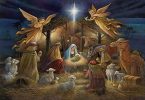27th Sunday of Ordinary Time (Year A)
Scripture: Is. 5:1-7; Ps. 79:9, 12-16, 19-20; Phil. 4:6-9; Mt. 21:33-43
We celebrate today the feast of St. Francis of Assisi. It will not be highlighted much because the Sunday liturgy supersedes over it. St. Francis was born to a rich family. His father was a cloth merchant. St. Francis in his youth was handsome, clever and gallant. He lavishly spent money. He loved music, parties, rich friends and fine clothing. He wanted to be a knight, therefore, he joined a military expedition against Perugia. He was imprisoned during the war for a year. Upon his release, an illness caused him to re-evaluate his life. There was a gradual process of his spiritual conversion. St. Francis had unique experiences at the ruins of the chapel of St. Damiano where the Crucified Lord commanded him, “Go! Francis and repair my house which is in ruins”. At another occasion, while participating in the mass, he received the mission command by Jesus to proclaim the Gospel. He renounced his worldly goods and his family ties. He embraced extreme poverty and began to serve the poor and the sick.
Today, St. Francis has influenced Christian life in a very profound way. His orders have been contributing to the mission of the church. His rule of life has been followed by many religious congregations. His religious practices such as the nativity scene, ringing the church bells are still in use. He has become the source of ecological spirituality. Pope Francis chose to be named after St. Francis of Assisi because he also finds St. Francis’ life inspiring him. Is it not sufficient to conclude that St. Francis of Assisi still influencing our lives till date? This is truly called the fruitfulness of life.
Today’s liturgy invites us to reflect on our lives to find out whether we are fruitful and productive in our lives or not. Prophet Isaiah in the first reading writes about the people of Israel. It is written in the context of unifying the divided kingdom of Israel. The people had lost their fear of God. They lived in sinfulness. He pens down the song of the vineyard. The owner of the vineyard takes utmost care of the vineyard. He dug the soil. He cleared the stones from the soil. He planted the choicest vine. He built a tower. He laboured so much that he expected good fruit but he got the sour grapes. After much efforts and hard work, the fruitlessness and unproductivity of the vineyard made the owner abandoned and disowned it. It was left to be trampled upon. It was cursed upon. Isaiah portrays Israel as a vineyard and God is the owner of the vineyard. Israel had been unproductive and fruitless. Their spiritual sterility, unfaithfulness, unjust ways had displeased God. He laments over the fruitlessness of Israel.
The same theme is carried forward in today’s Gospel. Jesus in the Gospel gives us an allegorized parable based on the first reading. Its importance is found when it appears in all three synoptic gospels. Jesus in the Gospel of Mathew makes some last efforts to persuade the leaders of the community especially the chief priests and the elders of the people to accept the good news of salvation. But they refused to listen to him. They remained stubborn, opposed and indifferent to Jesus’ teachings.
Jesus gives three parables in pursuit of winning the hearts of the leaders of the community. We have heard the first parable, last Sunday, about the two sons. The second one is narrated in today’s Gospel. The third one, the wedding banquet, will be narrated next Sunday. The parable of the wicked tenant is a summary of the full history of Israel-God relationship. It is a story of ungratefulness, unfaithfulness and hardheartedness of Israel, the most loved vineyard of God.
God patiently worked on the vineyard. He sent prophets one after another. At last, he sent His only Son but the tenants killed him. They thought the vineyard would be theirs. But they were wrong in their thinking. We need to note here carefully the difference between Isaiah and the Gospel of Mathew. Tenants are not mentioned in Isaiah. Isaiah addresses the fruitlessness and unproductivity of the people of Israel in general. While Mathew points out the fruitlessness or unproductivity in the leaders of the community who are seen as the tenants in the parable.
Jesus used the famous allegory of the vineyard in his parable to hit at the fruitlessness of the chief priests and elders of people. There is a stern warning that the vineyard would be given to the tenants who would deliver the fruits to him when the season arrives. He thus tells them that their wickedness would befall on them. They would lose their privilege. They would lose protection.
After 2000 years, Jesus is addressing the same parable to us. We are placed as the tenant of the vineyard. When Jesus comes to us for the fruits; are we fruitful and productive in our Christian living? Let us imagine, we are placed at vineyards of our lives, families, peer groups, communities, workplaces and parishes, etc. Like St. Paul who was placed among the Philippians. He perfectly followed the example of being a fruitful and productive tenant. He taught the Philippians everything to be noble, good, pure, virtuous and worthy of praise. He taught them by his words and deeds. He taught them to guard their hearts and thoughts in Christ. He was a fruitful and productive servant of God.
We need to be like St. Paul and St. Francis of Assisi. They were successful, fruitful and productive because they remained faithful to Jesus in their lives. We are also called to be fruitful and productive. We need to be faithful to Jesus’ teaching. Let us pray that we may learn to be more responsible in our Christian living. If we have failed, then let us plead like the psalmist today for the mercy that the face of the Lord may shine upon us and we shall be saved.






